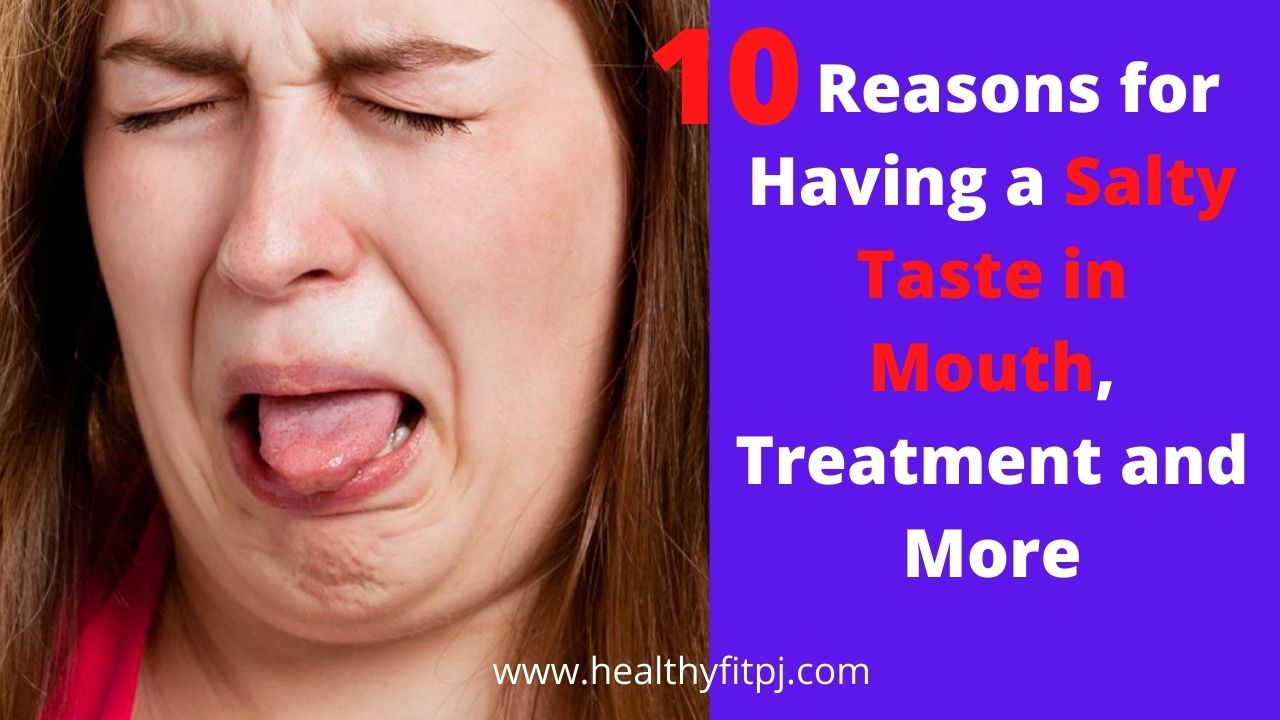Do you have a salty taste in your mouth when you wake up in the morning for the day? Sometimes it happens even when you haven’t eaten anything salty, and you may wonder what’s happening to taste. This stronger sensation is actually common.
It will not cause concern and be relaxing, but also it is good to see a doctor if you’re experiencing other symptoms. Sourness, bitterness or acidity may accompany the salty flavour in your mouth.
So, read the article till the end to understand the cause of the salty taste in your mouth, treatment for it and a few home remedies you can try at home.
- Also Read : How to Get Your Taste and Smell Back After COVID-19
- Also Read : How to Get Rid of Hiccups, Causes, Symptoms & Remedies
Table of Contents
Causes for Salty Taste in Mouth
Here are 10 reasons that can cause a salty taste inmouth, some causes are harmless, but others may require talking with a doctor.
01. Dehydration
Dehydration is a common cause of a salty mouth; it can also lead to other symptoms. Some people may become dehydrated after diarrhea or vomiting, others may become dehydrated when their body is short of liquid (water). This can cause saliva to become rich in salty minerals.
You may also experience symptoms of dehydration include:
- Confusion
- Dark or orange urine
- Extreme thirst
- Fatigue
- Dizziness
- Infrequent urination
- Weakness in body
Drinking a lot of alcohol can cause dehydration and also people who exercise strongly without drinking enough water can also cause dehydration. So, it’s important to drink between six to eight glasses of water each day.
You may also need more water if you are sick, in hot weather or if you exercise regularly. Without proper treatment or correct tablets can lead to underlying conditions.
02. Dry Mouth
Dry mouth is another condition that can give you a salty taste in mouth, and it is also one symptom of dehydration. The dry mouth is xerostomia and people with xerostomia may feel like they have cotton balls in the mouth, and they may also experience dry or sticky saliva.
Becoming dry mouth can be caused by smoking cigarettes, tobacco or certain medication side effects.
You may also experience some symptom include:
- Bad breath
- Sore throat
- Stringy or thick saliva
- Hoarseness
- Furrowed tongue
Dry mouth can be cleared up easily on your own. Make sure to drink enough water and try to avoid salty food until your symptoms go away.
03. Blood in the Mouth
A salty or metallic taste in your mouth, this can indicate the presence of blood in your mouth or oral bleeding. This can be happening for many reasons such as eating sharp foods like chips or hard candies, and you may also injure your gums while flossing or brushing your teeth.
If your gums bleed after you brush or floss your teeth, this can be symptoms of gum disease called gingivitis, this condition can also lead to sore and swollen gums over time.
Treatment is very important for effective recovery, otherwise, this disease can lead to an infection. If you’re feeling unexplained bleeding, then it is best to talk with a doctor first.
04. Nutritional Deficiencies
You may experience a salty or metallic taste in your mouth, the reason could be low levels of nutrients. Not getting enough or certain nutrients to your body can lead to a salty taste in your mouth. Nutrient’s deficiency can happen quickly or over several years.
You may also experience symptoms include:
- Fatigue
- Confusion
- Pallor
- Weakness
- Behavior changes
In this case consult a doctor, they will test your blood to find out which nutrients are lacking. They can suggest treatment includes a balanced diet and some form of supplements.
05. Oral Infection
Untreated gingivitis or delayed treatment for gingivitis can lead to an oral infection called periodontitis. If this is not treated early, in several cases it can harm your bones and teeth.
When gingivitis progresses to periodontitis can lead to a salty or iron taste in your mouth, it can also cases:
- Loose teeth
- Bad breath
- Open sores in the gums
- Gum abscesses
- Pus under your teeth
Bleeding also signals to other infections like oral thrush. This yeast infection causes white blotches that develop in the mouth, and you can experience a sensitivity or painful burning sensation in your mouth. While you may have difficulty tasting, or you may experience salty or bitter taste.
Human papillomavirus (HPV) can also cause a salty or metallic taste in the mouth. Typically, it doesn’t cause symptoms in the early stages, but if its symptoms are not controlled then it can cause hoarseness or coughing up blood, resulting in a salty taste in mouth.
06. Acid or Bile Reflux
If you experience acid or bile reflux, then you may feel a salty or sour taste in your mouth. This condition may come together or separate but both have similar symptoms. Acid reflux occurs when stomach acid flows into the esophagus, and bile reflux happens when bile fluid from the small intestine flows into the esophagus and stomach.
You will experience some other symptoms like:
- Nausea
- Coughing
- Weight loss
- Vomiting bile
- Heartburn
- Pain in your upper body
Without treatment, reflux can cause Gastroesophageal reflux disease (GERD), this may lead to a burning sensation in the chest. Diet and lifestyle changes, medications can treat reflux.
07. Postnasal Drip
Postnasal drip is common and you may occur by:
- Allergies
- The common cold
- Sinus infection
Postnasal drip involves mucus from your nose that can build up in your throat, and this can mix with saliva in your mouth, it can cause taste saltier than usual.
Many conditions like cold and allergies resolve on their own, over time medications can help to clear up a post nasal drip.
08. Side Effects of Medications
Some medications may dry out your mouth leading to a salty or metallic taste in your mouth. Immediately consult a doctor, they can identify if your taste is a side-effect of medications or not.
Some treatments also can affect your taste buds, and give you a salty taste. Many people experience dry mouth after treatment.
09. Hormonal Imbalances
Some hormonal imbalances like during pregnancy can cause your gums to change in taste buds, and this can lead to salty or metallic taste in the mouth. The taste or sensation may differ from woman to woman.
10. Medical Conditions
Some medical conditions can also affect the tongue, and give a metallic or salty taste in mouth. These can include nervous conditions or brain tumors, and a person with a neck or head injury may also experience salty taste in the mouth.
Note: if you experience any kind of taste or feel in taste, it’s best to talk with a doctor so they can determine the causes and they can help with better treatment.
Treatment for Salty Taste in Mouth
The proper treatment for salty taste in mouth can depend on the causes of salty taste. Many people drinking enough water can resolve these symptoms and for others need to visit a doctor or dentist for a diagnosis and treatments.
When a doctor identifies the cause of the salty taste, they will recommend a better treatment and suggest a balanced diet.
Home Remedies for Salty Taste in Mouth

Many people resolve this symptom by using home remedies, below are some home remedies for salty taste in mouth that you can try:
- Regularly flossing and brushing your teeth
- Cleaning your mouth with an antibacterial rinse
- Taking care of oral hygiene
- Drinking enough water throughout the day
- Reducing alcohol and tobacco in take
- Avoiding spicy foods and greasy foods
- Chewing sugar-free gum
You can try these home remedies at home for days, still you will not get results then consult a doctor because treatments are most effective when guided by a doctor or professional.
FAQs on Having Salty Taste in Mouth
-
Is the Salty Taste in Mouth a Symptom of Diabetes?
Having diabetes can be a greater risk for developing taste disorders, and taste disorders can cause odd or salty taste in the mouth. If you have both, you are at a higher risk of developing gum disease and other oral problems. So, it is best to consult with a doctor for more help or treatment.
-
What Medications Cause a Salty Taste in Your Mouth?
Not all the medications cause, but some medications cause salty, bitter or metallic taste in mouth, the medications like captopril, enalapril and lisinopril. These medications can affect your taste by causing zinc deficiency.
Conclusion
Many causes of a salty taste in mouth are simple to treat once they identify. So, keep in mind that drinking enough water and limiting your sodium intake may help you to get rid of the salty taste in your mouth.
If it is not resolving easily then talk with a doctor for more help and treatment.
Hopefully, you like this article if you have any questions and suggestions kindly put them in the comment box below.
You’ll also like:
- Sea Moss Health Benefits, Nutrition – How to Make Sea Moss Gel
- 11 Best Natural Blood Thinners That Prevent Stroke and Reduce Blood Clots
- Clonidine for Sleep – it’s Uses, Side Effects and its Alternatives
- 7 Ways to Lose weight with Lipedema – Symptoms, Best Diet for Lipedema
- 17 Foods That Build Your Immune System to Fight Covid-19
